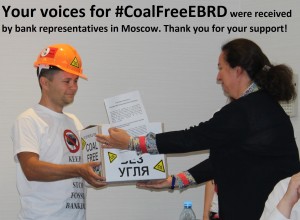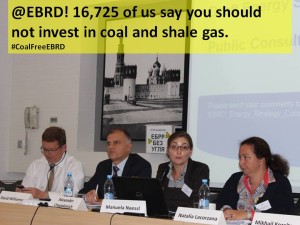European Bank of Reconstruction and Development (EBRD) has to follow the example of other large international investment organizations and stop lending for dirty energy projects. Around 17,000 signatures with such demand were handed over to the bank’s representatives today during an action in Moscow.
As the European Bank for Reconstruction and Development holds a series of consultations on its draft energy policy this week, pressure is growing on the bank to stop financing new fossil fuel projects, starting with coal and shale gas.
Despite major international public lenders such as the World Bank (WB) and the European Investment Bank (EIB) announcing tight limitations to their coal financing over the past months, the EBRD appears committed to keep financing the dirtiest of fossil fuels.
Today, during the bank’s public consultation in Moscow, Russia, activists from Clicr.ru, Eka Movement, National Environmental Center of Ukraine (NECU), Bankwatch and 350.org delivered to the EBRD a petition signed by about 17,000 people asking the bank to stop financing fossil fuels, starting with coal. A similar event took place on Monday in Istanbul and on Wednesday in Belgrade. Action was supported in social media with a hash-tag #coalfreeEBRD. Bank’s representatives said they would submit the petition and the comments to the main office in London.

“In Russia and in the whole region public banks like EBRD should finance only renewable energy sources and also initiatives in economies’ energy efficiency,” said action participant Oleg Savitskyi, energy campaigner at NECU. “There is a huge and yet unused potential in this sphere: energy intensity of Ukrainian and Russian economies is 2-3 times higher than in European countries. “
Between 2006 and 2011, while the current energy policy of the EBRD was in place, the bank’s annual coal lending actually increased from 60 million to 262 million euros, according to Bankwatch calculations. In this period, fossil fuel lending represented 48 percent of the institution’s overall energy lending portfolio.
The importance for the climate cannot be overstated: according to a 2012 report by the Carbon Tracker Institute in London, 80 percent of fossil fuel reserves must remain underground in order to keep global warming below 2°C.
„This year can and must constitute a turning point for global action against climate change,” comments Tim Ratcliffe, European Campaigner for 350.org. „One of the biggest imperatives right now is to put an end to public support for fossil fuels. The WB and the EIB have recently made it clear they want to put an end to dirty coal financing and pull their weight behind the low-carbon transition. If the EBRD does not follow suit with the upcoming energy strategy, it will not only get stuck with a portfolio of stranded assets, but also it will find it impossible to be a driver of change in its regions of operations since many private actors will have already moved faster than the EBRD and onto the low-carbon path.”
For additional information please contact:
Oleg Savitskyi, energy campaigner at National Environmental Center of Ukraine (NECU) [email protected]
Iryna Holovko, Bankwatch NGO network projects’ Coordinator in Ukraine
Tel. 8 (965) 163 56 38 (Sept 6th only). +38044 3623218 (in the next days)
Notes for editors:
(1) See the 350.org petition Divest EBRD From Fossil Fuels: http://act.350.org/sign/EBRD
(2) Read the EBRD draft energy policy proposed for public discussion this week: http://www.ebrd.com/pages/news/events/energy-policy-belgrade.shtml
(3) Read a press briefing on energy lending by European public banks (the European Investment Bank and the European Bank for Reconstruction and Development): http://bankwatch.org/sites/default/files/briefing-EnergyLending-22Apr2013.pdf
(4) Read report Invest in Haste, Repent at Leisure for more information on Europe’s development banks investing in fossil fuels: http://seechangenetwork.org/index.php/publications/invest-in-haste-repent-at-leisure.html
(5) On 16 September, Bankwatch is organising a google hangout with experts to discuss the EBRD energy review. If interested in attending, please email [email protected]. Invitations to follow.

